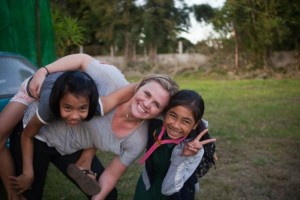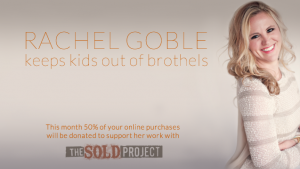This is exciting news and one that needs to be shared: Ember Arts, an online jewelry retailer, has chosen my daughter Rachel as their hero of the month for July! Ember has committed to giving 50% of the months proceeds to support Rachel’s work of keeping children out of brothels. This is a great opportunity for you to support this work while enjoying some wonderful artisan pieces.
Below is the story that Ember has posted about Rachel, which is great to read. Makes my heart proud as a father! And here is the link to their store: Ember Arts Store. Please take a look and help all involved. Thank you!
———————–
Earlier this year, in a small, green village in the hills of northern Thailand, a woman approached a 14-year-old girl and made her a simple offer. She could earn the equivalent of $1,000 dollars, the woman told her, for losing her virginity to a paying customer. This woman wasn’t going to forcibly kidnap her. The girl had the choice to say yes or no.
Silicon Valley native Rachel Goble, through her organization The SOLD Project, is working to educate Thai girls on the real terms of offers like these—that they won’t be paid $1,000, that they’ll likely be confined to a brothel for years and forced to sleep with not just one, but thousands of paying customers, that accepting one of these offers will lead to new kinds of pain and poverty, the kinds that tear not just at the stomach, but at the soul.
Rachel’s childhood was at the opposite end of nearly every spectrum from the poor, undereducated Thai girls most at risk of being trafficked. Her parents run Goble Properties, a San Jose commercial real estate company founded by her grandfather. The business afforded Rachel an idyllic childhood. “I lived down the street from some of my best friends,” she told me, “and so evenings and weekends were spent riding bikes between each others’ houses and getting into mischief.”
Rachel’s parents also had a unique passion that took her into a much larger world. “Some of my earliest memories are tromping through jungles looking for land while a Mayan man would swing a machete only inches from my head to clear a path,” Rachel recalled. Her parents began exploring the connections between the environmental damage and poverty in the Central American country of Belize. Rachel took her first of many trips to Belize when she was only nine.
By Rachel’s teenage years the Gobles had built Jaguar Creek, a sustainable center in the jungle to host teams from universities and churches around the world, who would come to learn how environmental degradation contributes to extreme poverty. Belize, Rachel said, was her second home. Her passport was completely filled with stamps by age fifteen. And she told me that her time there gave her a great and lasting gift: a sort of naivety in regards to cultural and socioeconomic boundaries, a comfort amidst difference.
It was this foundational comfort that allowed her to find one of the world’s most uncomfortable places, a place whose desperation became her calling. While traveling in India as part of her postgraduate work at Fuller Theological Seminary, Rachel visited a brothel. “We walked up sets of stairs to a hallway lined with rooms,” she recalled. “Each of these rooms was a waiting area that then had multiple doors that opened to bedrooms. This was where the women slept, as well as took customers.”
She sat down with two of the women in a waiting room and asked them their stories. One of the them, still in her early twenties and already a brothel veteran, said that unlike Rachel she had no opportunity, no way out. Although there were no bars or chains, she was trapped.
Trafficking is, in economic terms, people with opportunity and resources preying on those without, or put more simply, the rich paying to sleep with the poor. And Rachel, who had grown up with so much opportunity, now faced a woman whose life was shaped by the absence of opportunity. The consequences were unbearable. “I realized then that prevention was my calling,” said Rachel. “That no person should ever get to a place in their life where they’ve lost hope.”
About that same time Rachel was introduced to another Rachel, filmmaker Rachel Sparks, who was producing a film about trafficking in Thailand. When they both returned to the States they connected over similar experiences, and very similar conclusions: that trafficking is enabled by poverty, lack of education, a fundamental devaluation of girls and women, and that preventing trafficking starts with empowering girls.
In northern Thailand many families can’t afford much education, and by age 15 girls often have no choice but to drop out of school and start making an income for the family. But without the skills that a good education provides their chances to make money are extremely limited.
Rachel signed on to help produce the documentary, and to start a non-profit alongside the film to start doing the work of education and empowerment—the work of prevention—in Thailand. Today that non-profit, The SOLD Project, has 140 students on scholarship, giving them the education that might save them from the world of trafficking and prostitution. These students get mentored by staff and older students, and have access to a resource center that gives them a fun and encouraging place to spend their non-school hours. SOLD also teaches the communities where they work about the tricks and terrors of trafficking, helping bind them together in a sort of safety net of prevention.
The 14-year-old girl at the beginning of our story is one of these students. Her sister came to SOLD, scared, and told them about the trafficker. A thousand dollars is a near life-changing sum in the hills of northern Thailand, especially for a family in hard times, as theirs was. Many girls, too many, have been taken in by such shiny, empty promises.
But this 14-year-old girl said no. She told the SOLD staff later that she remembered the the anti-trafficking training she’d been given and she simply told the woman no. And the next morning, instead of going to a brothel, she went to school.
I don’t think it’s exaggerating to say that her life was saved.
This is what Rachel is after, that more girls, indeed all girls, have the education and opportunity to say no. “This is our message,” she says, “that child prostitution and exploitation can be prevented, and we all have a roll to play in ensuring that prevention.” And somehow her simple story about a girl in northern Thailand, more than a raft of statistics and annual reports, makes me think she must be right.


